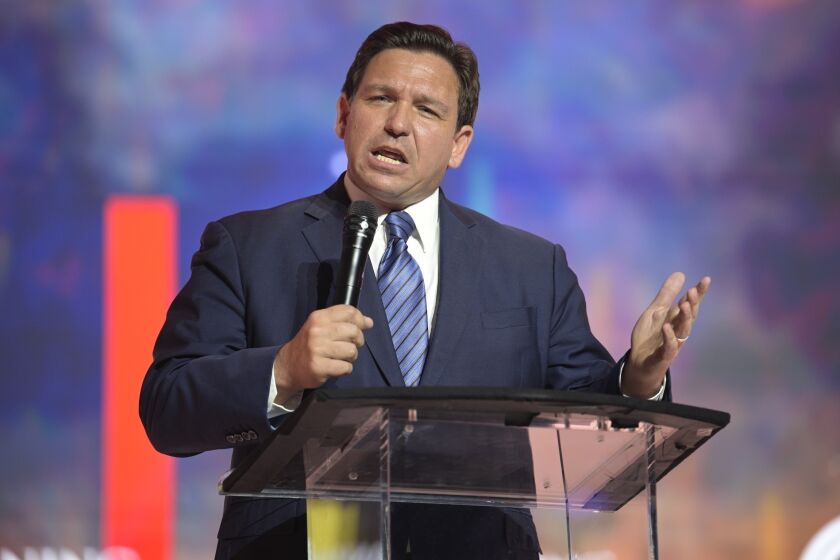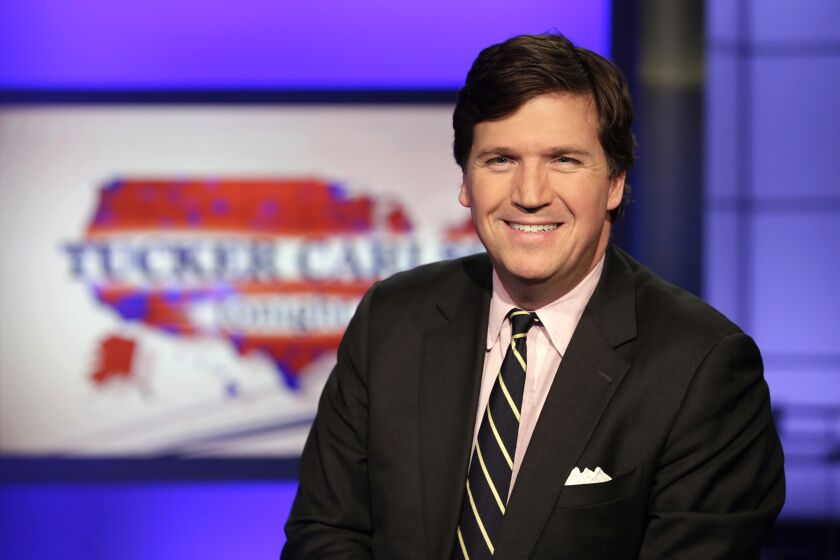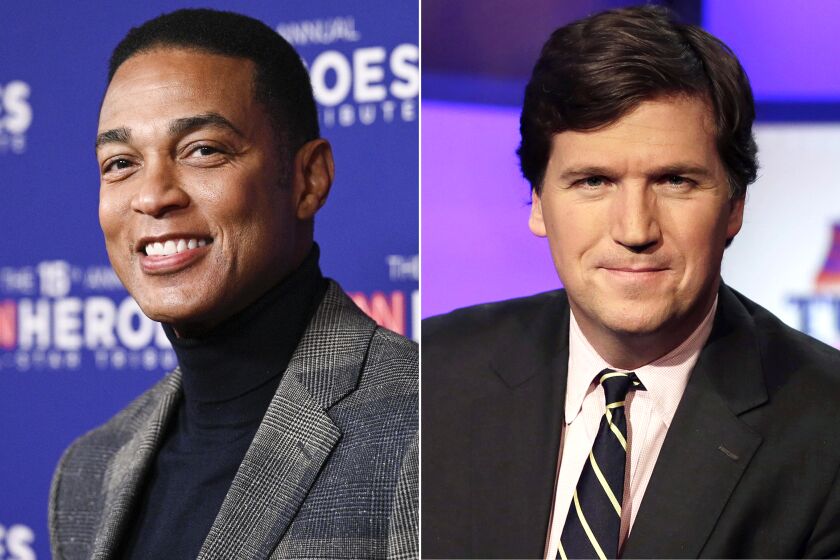Disney sues Ron DeSantis over Florida district: ‘A targeted campaign of government retaliation’

Walt Disney Co. on Wednesday sued Florida Gov. Ron DeSantis in the latest salvo in a long-running fight over the company’s self-governing powers in the area of the state that encompasses Walt Disney World Resort.
“A targeted campaign of government retaliation — orchestrated at every step by Governor DeSantis as punishment for Disney’s protected speech — now threatens Disney’s business operations, jeopardizes its economic future in the region, and violates its constitutional rights,” Disney said in a complaint filed in U.S. District Court for the Northern District of Florida in Tallahassee.
The Republican governor — who is widely expected to run for president in 2024 — has made his battle against Disney a cornerstone of his culture wars campaign, at times referring to the legendary California company as a “woke Burbank corporation.” The feud began last year after Disney spoke out against Florida’s so-called Don’t Say Gay legislation, which banned education on sexual orientation and gender identity in kindergarten through third grade. DeSantis has since pushed to expand the prohibition to all grades.
Disney, under pressure from employees, opposed the law, saying “it could be used to unfairly target gay, lesbian, non-binary and transgender kids and families.” The company said it would reassess its campaign contributions to state lawmakers.
DeSantis lashed out, leading an effort to strip Disney’s self-governing powers for its parks, privileges the company has enjoyed for more than a half-century. DeSantis signed legislation in late February that allowed the state to take control of the Disney-controlled Reedy Creek Improvement District and replace it with a tourism oversight board.
The governor hand picked members for the district’s new board, filling it with cultural conservatives and political allies — only to learn that the outgoing Reedy Creek supervisors had preemptively undercut the state’s power with a development deal giving Disney authority until at least 21 years past the death of the last surviving descendant of Britain’s King Charles III.
DeSantis and his allies were stunned, and quickly moved to reverse those changes.
Wednesday’s lawsuit, seeking declaratory relief and an injunction, was filed just minutes after that DeSantis-appointed Walt Disney World oversight board voted to invalidate changes that Disney had attempted to make earlier this year. The company is seeking to preserve its ability to make land-use decisions over the 43-square-mile region that includes Disney’s central Florida theme parks, including Walt Disney World and Epcot.
DeSantis’ office swiftly slammed Disney’s lawsuit, suggesting that Disney was the one that was abusing its power.
“We are unaware of any legal right that a company has to operate its own government or maintain special privileges not held by other businesses in the state,” the governor’s spokesperson, Taryn Fenske, said in a statement Wednesday. “This lawsuit is yet another unfortunate example of their hope to undermine the will of the Florida voters and operate outside the bounds of the law.”
Disney’s shareholder meeting comes amid Florida Gov. Ron DeSantis’ war on the Burbank company, which is seeking to put a bruising year in the rearview mirror.
In the lawsuit, Disney listed the benefits the company has provided the Sunshine State during the past 50 years, including “establishing Central Florida as a top global tourist destination and attracting tens of millions of visitors to the state each year.”
Disney noted it that it was one of the region’s largest taxpayers, contributing more than $1.1 billion in state and local taxes last year. It is also one of Florida’s largest employers, with more than 75,000 employees.
The lawsuit echoed Disney Chief Executive Bob Iger’s suggestion that DeSantis’ efforts were retaliation for Disney practicing its 1st Amendment rights to free speech.
“At the Governor’s bidding, the State’s oversight board has purported to “void” publicly noticed and duly agreed development contracts,” Disney’s suit said. “This government action was patently retaliatory, patently anti-business, and patently unconstitutional.”
Efforts during the past year to defuse the situation had been rebuffed, Disney said.
“The Governor and his allies have made clear they do not care and will not stop,” the lawsuit states. “The Governor recently declared that his team would not only ‘void the development agreement’ — just as they did today — but also planned ‘to look at things like taxes on the hotels,’ ‘tolls on the roads,’ ‘developing some of the property that the district owns’ with ‘more amusement parks,’ and even putting a ‘state prison’ next to Walt Disney World.”
In the latest volley in the ongoing feud between Ron DeSantis and Walt Disney Co., the Florida governor suggested Monday that the state could assert control over land around Disney World.
Harvard constitutional law professor Laurence Tribe accused DeSantis of “doubly violating” the 1st Amendment, first with the Don’t Say Gay legislation, and then again by threatening retaliation against Disney for opposing that bill.
The latter, Tribe said, “violates both the free speech clause and the freedom of petition clause of the 1st Amendment.”
“Conservatives like it when a decision like Citizens United protects the free speech rights of corporations that try to influence our politics in a right-wing direction,” Tribe said, referencing the controversial 2010 Supreme Court ruling that gave companies the same rights as people. “They can’t suddenly pretend that corporations don’t have free speech rights when they don’t like what the corporations are saying.”
And as for the possibility that DeSantis will argue that the steps he’s taken to push back on Disney are unrelated to the company’s speech?
“We can expect him to try,” Tribe said, “just like we can expect Mickey Mouse to fly.“
Disney said it regretted suing DeSantis and other state leaders.
“But having exhausted efforts to seek a resolution, the Company is left with no choice but to file this lawsuit to protect its cast members, guests, and local development partners from a relentless campaign to weaponize government power against Disney in retaliation for expressing a political viewpoint unpopular with certain State officials,” the suit said.
Staff writer Ryan Faughnder contributed to this report.
Inside the business of entertainment
The Wide Shot brings you news, analysis and insights on everything from streaming wars to production — and what it all means for the future.
You may occasionally receive promotional content from the Los Angeles Times.








